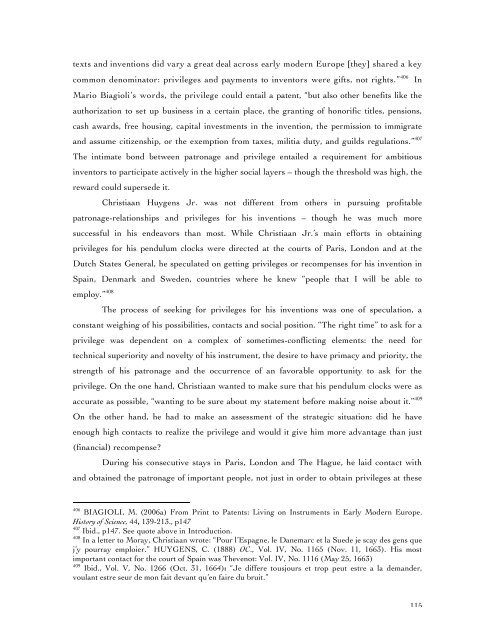Christiaan Huygens – A family affair - Proeven van Vroeger
Christiaan Huygens – A family affair - Proeven van Vroeger
Christiaan Huygens – A family affair - Proeven van Vroeger
You also want an ePaper? Increase the reach of your titles
YUMPU automatically turns print PDFs into web optimized ePapers that Google loves.
texts and inventions did vary a great deal across early modern Europe [they] shared a key<br />
common denominator: privileges and payments to inventors were gifts, not rights.” 406 In<br />
Mario Biagioli’s words, the privilege could entail a patent, “but also other benefits like the<br />
authorization to set up business in a certain place, the granting of honorific titles, pensions,<br />
cash awards, free housing, capital investments in the invention, the permission to immigrate<br />
and assume citizenship, or the exemption from taxes, militia duty, and guilds regulations.” 407<br />
The intimate bond between patronage and privilege entailed a requirement for ambitious<br />
inventors to participate actively in the higher social layers <strong>–</strong> though the threshold was high, the<br />
reward could supersede it.<br />
<strong>Christiaan</strong> <strong>Huygens</strong> Jr. was not different from others in pursuing profitable<br />
patronage-relationships and privileges for his inventions <strong>–</strong> though he was much more<br />
successful in his endeavors than most. While <strong>Christiaan</strong> Jr.’s main efforts in obtaining<br />
privileges for his pendulum clocks were directed at the courts of Paris, London and at the<br />
Dutch States General, he speculated on getting privileges or recompenses for his invention in<br />
Spain, Denmark and Sweden, countries where he knew “people that I will be able to<br />
employ.” 408<br />
The process of seeking for privileges for his inventions was one of speculation, a<br />
constant weighing of his possibilities, contacts and social position. “The right time” to ask for a<br />
privilege was dependent on a complex of sometimes-conflicting elements: the need for<br />
technical superiority and novelty of his instrument, the desire to have primacy and priority, the<br />
strength of his patronage and the occurrence of an favorable opportunity to ask for the<br />
privilege. On the one hand, <strong>Christiaan</strong> wanted to make sure that his pendulum clocks were as<br />
accurate as possible, “wanting to be sure about my statement before making noise about it.” 409<br />
On the other hand, he had to make an assessment of the strategic situation: did he have<br />
enough high contacts to realize the privilege and would it give him more ad<strong>van</strong>tage than just<br />
(financial) recompense?<br />
During his consecutive stays in Paris, London and The Hague, he laid contact with<br />
and obtained the patronage of important people, not just in order to obtain privileges at these<br />
406<br />
BIAGIOLI, M. (2006a) From Print to Patents: Living on Instruments in Early Modern Europe.<br />
History of Science, 44, 139-213., p147<br />
407<br />
Ibid., p147. See quote above in Introduction.<br />
408<br />
In a letter to Moray, <strong>Christiaan</strong> wrote: “Pour l’Espagne, le Danemarc et la Suede je scay des gens que<br />
j’y pourray emploier.” HUYGENS, C. (1888) OC., Vol. IV, No. 1165 (Nov. 11, 1663). His most<br />
important contact for the court of Spain was Thevenot: Vol. IV, No. 1116 (May 25, 1663)<br />
409<br />
Ibid., Vol. V, No. 1266 (Oct. 31, 1664): “Je differe tousjours et trop peut estre a la demander,<br />
voulant estre seur de mon fait de<strong>van</strong>t qu’en faire du bruit.”<br />
115


